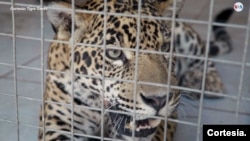In Bolivia, a legend tells that the human being can become a jaguar to merge with the jungle and preserve the territory, whoever achieves it is a “Tiger People”, and that is the name of the documentary that shows the trafficking of the largest feline in America to China.
The project began seven years ago, between the idea and the collaboration, with the impulse of the American documentalist Elizabeth Unger, who decided to dedicate herself to scientific research and specifically to this problem after working in Bolivia as a volunteer in a rescue center of wild life.
Unger, director of “Tigre Gente”, was able to document one of the biggest cases of trafficking in 2018 and unveil it in this documentary thanks to two protagonists who joined the journey: Marcos Uzquiano, Bolivian park ranger and Laurel Chor, investigative journalist from Hong Kong.
“We had to maintain a certain investigative ethic to tell the story and show the truth from journalism. And as filmmakers to be able to change hearts and minds on this issue,” says producer Natalie Conneely to the Voice of America.
Conneely is Bolivian and currently based in Los Angeles. She explains that one of the main objectives of the film is to show all the parts and demystify that “blame lens” with which traffic is sometimes understood. “It is not just about the people who are hunting in Bolivia or those who are buying from China, but about everyone who is in that chain of illegal activities.”
According to the World Wide Fund for Nature, it is estimated that there are between 64,000 and 170,000 jaguars left in the world, and fewer than 10,000 in Bolivia. The black market that is killing the largest cat in America. But why is the jaguar so coveted?
Although the most demanded are the fangs, various parts such as their skin, bones, testicles and meat are commercialized and as Conneely explains, there is a cultural theme and very old traditions behind the “belief in their strength, energy and virility, but not there is nothing scientific to back this up.”
Jaguar fangs, used mainly in jewelry, fetch ten times the price in China than in South America. In addition, some medicinal properties are attributed to it. “Jaguars are killed for their fangs and not many people recognize that truth. They think that the jaguar dies naturally and then they remove their fangs”, adds the producer of the documentary.
Committed to defending the jaguar
Bolivian Marcos Uzquiano, who currently works as head of Protection of the Biosphere Reserve Estación Biológica in the department of Beni, has dedicated almost his entire life to protecting jaguars from the black market, even risking his life along with other park rangers. For him, this animal is part of his family and he remembers that he made a promise to protect them, “before it is too late.”
“Trafficking continues, jaguars continue to be hunted also due to conflicts such as agricultural expansion, cattle ranching, deforestation and other extractive activities that affect the habitat and ecosystem of the species. That is why a greater effort is demanded from the State, from civil society and from the countries of the region to carry out a true plan for the conservation and protection of the species,” Uzquiano assured the Voice of America.
The other protagonist of “Tiger Gente” is the investigative journalist Laurel Chor, who from Hong Kong portrays the beliefs of Asian culture around the jaguar and the impact on the new generations with very personal interviews. “There must be a stronger Chinese voice in all of this, if we work together and understand each other, we could make a difference,” Chor says in part of the documentary.
These two visions, both from Bolivia and from China, merge into a story that invites us to reflect on the importance of the jaguar in local culture and in the ecosystem to promote conservation policies in Latin America.
“Tigre Gente” premiered at the Tribeca festival in New York in 2021, last year National Geographic acquired the rights and since this month it has been broadcast to Bolivia and countries in the region. But it is also planned to reach rural communities with the documentary from October, as part of an impact campaign.
Connect with the Voice of America! Subscribe to our channel Youtube and activate notifications, or follow us on social networks: Facebook, Twitter and Instagram.
















